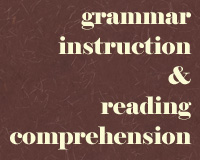
by Timothy Shanahan
University of Illinois at Chicago
January 15, 2014
I recently received this question from a fourth grade special education teacher in New York City: “I was wondering what your opinion/research shows as far as the relationship between grammar instruction and reading comprehension. Do you have any preference as far as grammar programs/teaching methodologies go?”
 In response to this excellent question, I’d say that there is a lot of evidence showing the importance of grammar in reading comprehension. Studies over the years have shown a clear relationship between syntactic or grammatical sophistication and reading comprehension; that is, as students learn to employ more complex sentences in their oral and written language, their ability to make sense of what they read increases, too.
In response to this excellent question, I’d say that there is a lot of evidence showing the importance of grammar in reading comprehension. Studies over the years have shown a clear relationship between syntactic or grammatical sophistication and reading comprehension; that is, as students learn to employ more complex sentences in their oral and written language, their ability to make sense of what they read increases, too.
Also, readability measures are able to predict how well students will comprehend particular texts on the basis of only two variables: vocabulary sophistication and grammatical complexity. At least for the Lexile formula, grammar is much more heavily weighted than vocabulary. This means that the text factor that is most predictive of comprehensibility is how complicated the sentences are grammatically.
There are also experimental studies that show that there are ways that grammar can be taught formally that improve reading comprehension.
To read my full response, see “Grammar and Comprehension: Scaffolding Student Interpretation of Complex Sentences” on the Shanahan on Literacy blog.
Timothy Shanahan is a member of the International Reading Association’s Literacy Research Panel, the group who coordinates this blog. Read more about the LRP Blog here. Reader response is welcomed. E-mail your comments to LRP@reading.org
The views expressed in this piece are the author's (or authors') and should not be taken as representing the position of the International Literacy Association or of the ILA Literacy Research Panel.